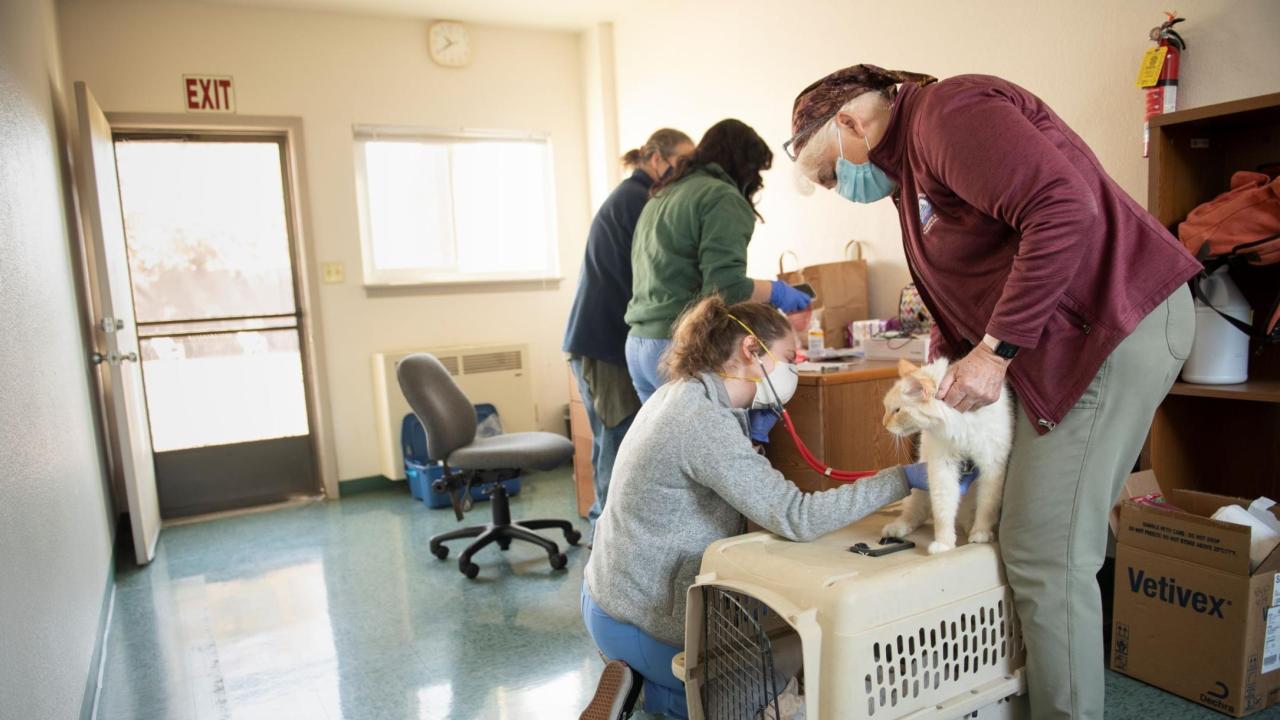
UC Davis Veterinary Students Expand Care for Pets of Homeless
Crissy Phillips has been a pet owner for many years and grew up with horses and other animals. Nothing has stopped her from providing the best possible care for her animals – not homelessness, not her battle with clinical depression, and not her daily struggles to provide for them. Her dedication shines through—easily apparent as she unveils a thick file of her two cats’ medical records—and just became a bit easier with the opening of a new clinic for pets of the homeless in Davis.
Davis Pet Advocacy and Wellness (PAW): A Clinic for the Pets of the Homeless is a local satellite clinic of the existing Mercer Veterinary Clinic for the Pets of the Homeless established in Sacramento by students and faculty members of the UC Davis School of Veterinary Medicine (SVM). Opened in November, Davis PAW looks to establish monthly clinics, and not only provides a valuable service to the community’s homeless population, but also provides hands-on experience for UC Davis veterinary students, as well as a basis for research on pets of the homeless.
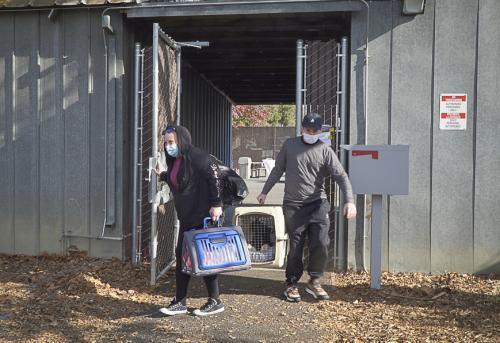
The new clinic has been more than a year in the making and arose out of SVM faculty member Dr. Janet Foley’s desire to provide for an important demographic that was not being served by the Mercer Clinic.
“The Davis community is our home, so it’s important for the veterinary school to provide this service beyond Sacramento,” stated Dr. Foley, Davis PAW’s faculty advisor. “It has always been important for me to give to the community. I have volunteered with homeless shelters over the years, but not in a veterinary capacity. Given my skillset as a veterinarian, this is the best way for me to give back to Davis.”
Dr. Kim Conway, a veterinarian and graduate student in the SVM’s Master of Preventive Veterinary Medicine degree program—of which Dr. Foley is chair—was eager to get on board. While brainstorming research ideas, the pair decided on a collaboration with Davis PAW. Dr. Conway’s research project—entitled “Pet ownership in the homeless population in Yolo and Sacramento Counties”—was hatched.
Her research is focusing on investigating the benefits, disease prevalence, and public perception of the homeless community owning pets.
“If you look at the published literature on this subject, it’s overwhelmingly apparent how beneficial pets are to the homeless,” said Dr. Conway. “Pets can improve their mental and emotional health, as well as prevent suicide and decrease drug use.”
This is certainly the case for Phillips, a Davis PAW guest at their December clinic, who credits her cats—Mamas, a black cat; and Mow Mow, a Maine Coon—with saving her life.
“I don’t think I’d be alive today if it weren’t for my cats because of my depression, anxiety, and mental health issues,” said Phillips. “They definitely improve my attitude about life and keep me optimistic about the future. They know when I’m sad and attempt to cheer me up. They help keep me happy.”
Currently in treatment for depression and post-traumatic stress disorder, Phillips struggled for years with homelessness.
“When I was homeless, I always felt safer with my cats around,” said Phillips. “They protected me from strangers.”
She and fiancé Johnny Burgos found housing recently in Sacramento through the Section 8 Housing Program. While Burgos’ minimum wage salary delivering pizzas and Phillips’ Social Security Disability Insurance help make ends meet, their life is far from ideal.
“We live in kind of a rough neighborhood,” Burgos said. “It’s not uncommon to hear gunshots where we live.”
Phillips and Burgos credit Mamas and Mow Mow with helping them traverse their difficult lives. That is why they are eager to keep them healthy, but veterinary care is not in their budget.
“You have no idea how helpful this clinic is for us,” said Phillips.
A Community Partnership
“For many people living in unsheltered circumstances, they have animals that are key parts of their lives,” said Ryan Collins, homeless outreach services coordinator with the Davis Police Department. “Often times, these animals can act as a barrier for them to access services or housing they need to improve their circumstances. Because there is such a close bond, and that animal has provided them with something lifesaving—whether it’s a warm body during a cold winter night or helping them with activities of daily living—they are not willing to give up the pets. Davis PAW has stepped up to provide care for people who cannot afford it or otherwise would not be able to access it. And that care, such as a vaccination certification, can literally open doors for them to gain housing.”
While Davis PAW is run by students and faculty members of the SVM, the clinic is a joint effort between members of the veterinary school, the City of Davis, and CommuniCare Health Centers. CommuniCare provides health services for the homeless population at the Davis Community Clinic near Sutter Davis Hospital as well as day services for the homeless in the city-owned Respite Center on L Street – the same location where Davis PAW holds their monthly veterinary clinics.
“There is such a need for this in the Davis community,” said Rebecca Trujillo, a behavioral health supervisor with CommuniCare. “This is an amazing opportunity for the homeless population to receive veterinary care for their animals, to complement what CommuniCare can provide.”
Helping the Next Generation of Veterinarians
Since 1992, the Mercer Clinic has provided UC Davis veterinary students and undergraduates additional hands-on experience working with animals before they enter their clinical rotations in the school’s veterinary hospital during their fourth and final year of veterinary school. Last year alone, more than 100 students volunteered with the clinic. While Davis PAW is just beginning, the team hopes that it can provide the same level of care and experience for years to come.
“This is a mentored opportunity for first- through third-year veterinary students to practice clinical skills,” said Dr. Foley. “The Davis PAW model also gives the students clinic management experience which will help them in their careers.”
Dr. Foley emphasizes that Davis PAW offers the additional benefit of helping students understand that clients and their pets are not “one-size-fits-all.”
“Our guests provide different care for their animals than a non-homeless pet owner might,” Dr. Foley said. “The students have to learn how to work with each guest, listen to what they need, and help provide that. It’s really important for students to learn that aspect of ‘doctoring.’”
Dr. Leslie Woods, a faculty pathologist in the school’s California Animal Health and Food Safety Laboratory, is excited for the students as they launch Davis PAW.
“When I was a student, there was nothing like Davis PAW to provide the ability to get experience in practice (outside of the educational setting in our fourth year) – we barely touched an animal in our first three years of veterinary school,” said Dr. Woods. “Our students all have huge hearts, and they want to make an impact on society. This is a wonderful opportunity to help them achieve their career goals.”
As Dr. Woods nears retirement as a pathologist, she sees her volunteer work with Davis PAW as a way for her to stay active in the veterinary profession while giving back to the community.
Veterinary students Jordan Nunes and Casey Conlon, along with undergraduate Raina Jasuja, participated in Davis PAW’s December clinic. Nunes and Conlon were both head coordinators at Mercer Clinic last year, so their experience running the clinic is just the boost Davis PAW needs to successfully launch their venture.
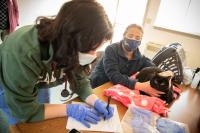
“We recognize how strong the human-animal bond is between the homeless and their pets, and we want to ensure that those pets receive proper care,” said Nunes, a third-year veterinary student from Tracy. “I definitely feel more connected to the community working at the clinic, and the experience gained here will certainly help toward my career goals of being a general practitioner and clinic owner.”
“We feel an obligation to help every animal in our community,” said Conlon, a third-year veterinary student from Danville. “Davis PAW is the way we can do that.”
Jasuja, a wildlife, fish, and conservation biology major, has worked with the Mercer Clinic since beginning college. Driven by an interest in attending veterinary school, she realized that volunteering with the clinic gave her the opportunity to help those in need while also confirming her aspirations of a career in veterinary medicine.
“The homeless population face a lot of hardships getting care for their animals,” said Jasuja, a junior from Pleasanton who is assisting with Dr. Conway’s research project. “It’s not because they’re not driven to take care of them. So, any way we can use our research to help make pet care and housing more accessible to them is important to me. We can’t discriminate against homeless people with pets just because they refuse to give up that companionship when it comes to finding somewhere to live.”
Learning Through Research
Beyond looking into the benefits of pet ownership by the homeless, Dr. Conway’s research is also investigating the higher risk for certain diseases in those pets, caused by fleas, ticks, or mosquitos.
“So how do we balance those benefits with the risks, and the benefit to the pet as well?” asks Dr. Conway. “These pets often get to spend 24/7 with their owners. I suspect the human-animal bond is actually stronger in this population compared to an environment for a housed pet who may go all day without seeing its owner.”
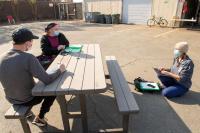
Part of Jasuja’s job at the clinic is to gather information from the Davis PAW guests on how much time they spend with their pets, how their pets help them emotionally, what is their exposure to fleas/ticks, and other environmental factors. Blood from all animals is collected to test for nine diseases to see if homeless pets are having a higher prevalence of these diseases compared to housed pets.
“This clinic encompasses two things I’m really passionate about,” said Dr. Conway. “First, it’s a unique opportunity to explore the epidemiology of zoonotic diseases and disease transmission on an owner-to-pet level. Second, it gives me the opportunity to continue to evolve my giving to the homeless community. I used to just give money to people on the street thinking I was doing the right thing. As I got older, I prepared care packages to give. Now, Davis PAW is a way for me to use my education to give back to this community in a way that I know is meaningful.”
Healthy and Happy Pets
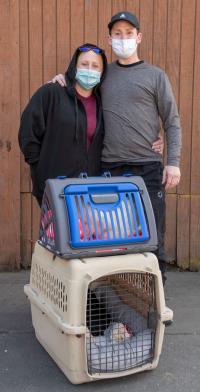
As for Mamas and Mow Mow, they are doing well after their examinations. They were each given vaccinations, flea/tick preventative, a nail trim, and a blood test to check for any underlying diseases that may be causing the digestive issues that prompted their visit. The veterinarians and students believe the digestive problems can be solved with a diet change if no systemic problems are found through the blood test. Phillips and Burgos will follow up at the January clinic and bring Mamas and Mow Mow in for urine and fecal tests.
Overall, the cats look healthy, and that is a testament to Phillips’ dedication as a pet owner.
“They’re my family,” said Phillips. “They’re like my children. Pets need to be loved and cared for just like people.”
# # #
Davis Pet Advocacy and Wellness (Davis PAW) is a volunteer-operated 501(c)(3) non-profit clinic providing medical care to the animal companions of those experiencing homelessness in Davis, California. While it operates under the governance of the UC Davis School of Veterinary Medicine, it is a separate non-profit entity. The Davis PAW team consists of volunteer veterinarians, veterinary students, and community members working in concert with the City of Davis to increase access to care and promote the well-being of all animals. Individuals, corporations, or veterinary clinics interested in supporting Davis PAW can visit their website to learn how donations can go a long way toward helping the clinic achieve its goals.
